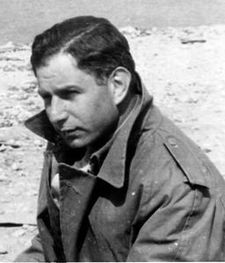The Lord Zuckerman | |
|---|---|
 Zuckerman photographed in Tobruk in 1943 during the Western Desert Campaign | |
| Born | Solomon Zuckerman 30 May 1904 |
| Died | 1 April 1993 (aged 88) London, England, United Kingdom |
| Citizenship | British |
| Alma mater | University of Cape Town Yale University |
| Spouse | |
| Children | 2 |
| Awards | |
| Scientific career | |
| Fields | Zoology, anatomy, operational research |
| Institutions | University of Oxford University of Birmingham University of East Anglia |
Solomon "Solly" Zuckerman, Baron Zuckerman OM KCB FRS[1] (30 May 1904 – 1 April 1993) was a British public servant, zoologist and operational research pioneer. He is best remembered as a scientific advisor to the Allies on bombing strategy in the Second World War, for his work to advance the cause of nuclear non-proliferation, and for his role in bringing attention to global economic issues.[2][3][4][5]
- ^ a b Krohn, P. L. (1995). "Solly Zuckerman Baron Zuckerman, of Burnham Thorpe, O. M., K. C. B. 30 May 1904 – 1 April 1993". Biographical Memoirs of Fellows of the Royal Society. 41: 576–598. doi:10.1098/rsbm.1995.0034. PMID 11615365. S2CID 11499508.
- ^ Burt, J. (2006). "Solly Zuckerman: The making of a primatological career in Britain, 1925–1945". Studies in History and Philosophy of Science Part C: Studies in History and Philosophy of Biological and Biomedical Sciences. 37 (2): 295–310. doi:10.1016/j.shpsc.2006.03.007. PMID 16769561.
- ^ King, Steve "From boffin to baron" Archived 5 June 2011 at the Wayback Machine, The Spectator (9 June 2001)
- ^ Peyton, John (2001). Solly Zuckerman: a scientist out of the ordinary. London: John Murray. ISBN 0-7195-6283-X.
- ^ Zuckerman, Solly (1971). Beyond the ivory tower: the frontiers of public and private science. New York: Taplinger Pub. Co. ISBN 0-8008-0733-2.